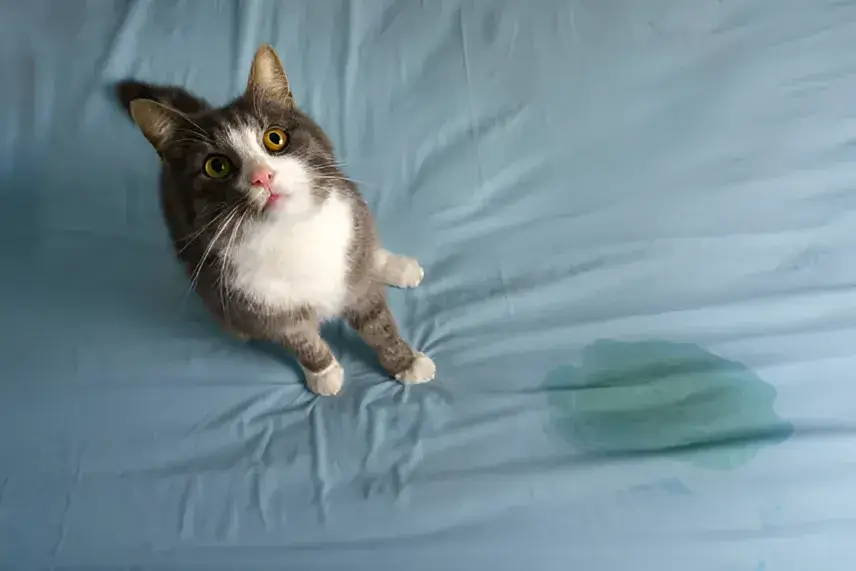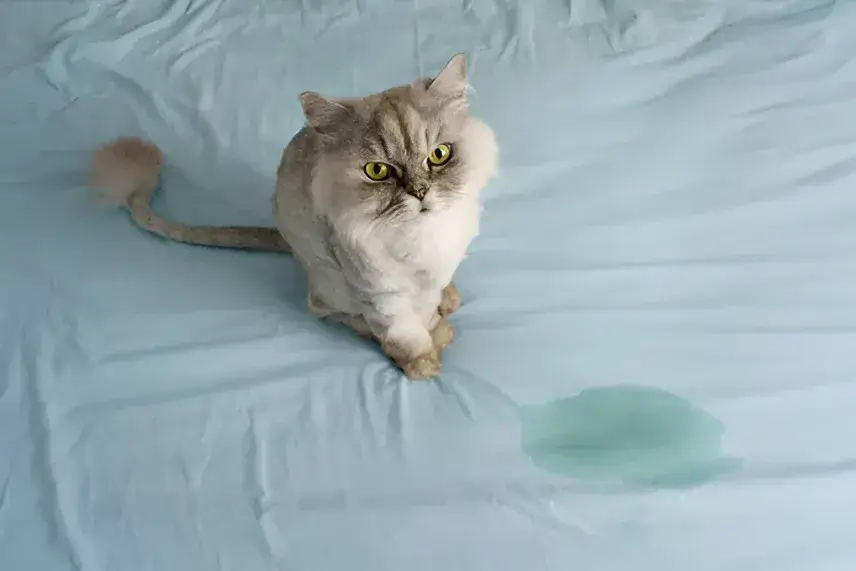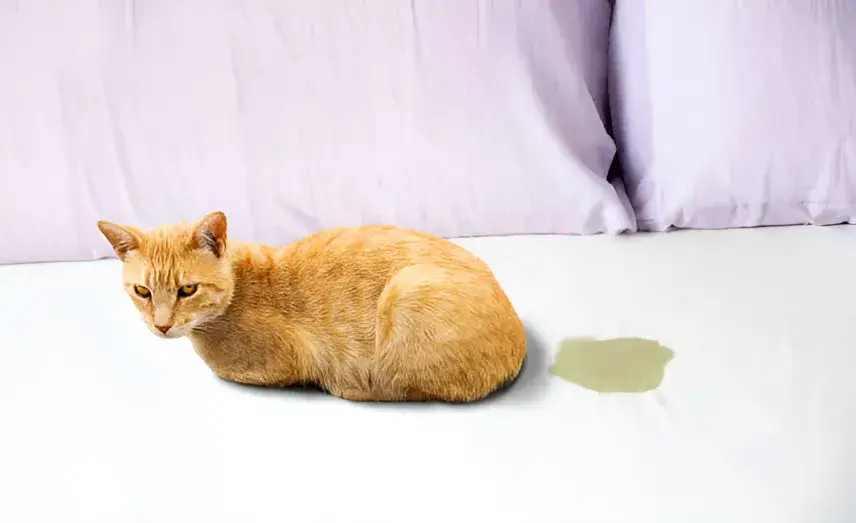Before addressing the behavior, it’s essential to rule out underlying medical problems. Have your veterinarian check your cat, as issues like urinary tract infections (UTIs), bladder problems, diabetes, and other conditions can cause a cat to urinate inappropriately. This is a crucial first step in understanding and resolving how to stop your cat from peeing on the couch.
Potential Reasons for Couch-Peeing
Medical Conditions: Always consult a vet first to check for health issues that can contribute to the behavior.
Stress and Anxiety: Changes in your household – a new pet, a move, or even shifts in your schedule – can trigger stress-related peeing in some cats.
Litter Box Dissatisfaction: Cats are particular about their bathrooms! Consider the location, cleanliness, size, and even the litter type if your cat seems unhappy with their box.
Marking Territory: If you suspect territorial spraying (often a smaller volume of urine, with a stronger odor), look for potential triggers like other cats in the house or neighborhood.
How to Stop the Couch-Peeing and Restore Harmony
1. Veterinary Visit: This is the crucial first step. Once any medical concerns are addressed, you can focus on behavioral solutions.
2. Rethinking the Litter Box:
- Peaceful Placement: Choose a quiet, low-traffic area with privacy for the box.
- Maintain Cleanliness: Scoop waste daily and fully clean the box weekly with mild, unscented soap.
- Cater to Preferences: Most cats prefer unscented, clumping litter. Experiment if needed.
- Size and Quantity: The box should be at least 1.5 times as long as your cat, and the golden rule is one box per cat, plus a spare.
3. Easing Stress:
- High Ground: Cat trees and shelves provide secure vantage points to survey their surroundings.
- Safe Zones: Provide cozy hiding places like boxes or cat-specific havens.
- Play and Enrichment: Regular interactive play relieves stress and boredom.
- Consider Calming Aids: Ask your vet about pheromone products (like Feliway) for an extra sense of serenity.
4. Cleaning Thoroughly:
- Odor Elimination: Enzymatic cleaners are specially formulated to break down cat urine, preventing repeated marking of the same spot. Avoid products with ammonia, which can smell like urine to cats.
5. Addressing Marking Behavior:
- Spot the Triggers: Pinpoint changes or stressors that might prompt marking.
- Limit Access: Temporarily restricting access to the cat’s favorite marking locations can help.
- Approved Deterrents: Use cat-safe deterrent sprays designed for this purpose (test on fabrics first).
Real-Life Success Stories

Max’s Litter Box Epiphany: “My cat Max, after a recent move, started peeing on the living room rug. A vet check ruled out medical issues. I realized the new location put his litter box in a high-traffic area. Relocating it to a quiet corner, with a larger box, did the trick. Max is back to using his box, and my rug is safe!” – Sarah H., Maine
Calming Sprays to the Rescue: “My two cats, formerly the best of friends, started spraying after we brought in a foster kitten. Feliway diffusers in common areas calmed them down significantly, and the spraying stopped within a week. Now everyone’s using the litter box again.” – David L., California
What If My Cat Does This?
My cat only pees on the couch when I’m away: This could point to separation anxiety. Try leaving out puzzle feeders for mental stimulation, catnip toys for enjoyment, and consider seeking veterinary advice for potential anxiety management solutions.
My cat pees on the couch right in front of me: This is more likely marking behavior, signaling dominance or a response to stress. Focus on reducing triggers and consider calming aids like Feliway.
My cat abruptly stopped using the litter box: A sudden shift often means either a medical reason or a strong dislike of the current litter box arrangement. It’s time for a vet check, a deep clean of the box, and potentially experimenting with other litter box setups.
Additional Tips
- Diet: Talk to your vet about food that promotes urinary health.
- Cover the couch: Temporarily cover trouble spots with plastic, foil, or a shower curtain to deter repeat offenses while you address the problem.
Expert Advice

Dr. Sarah Bennett, a veterinarian specializing in feline behavior says, “Inappropriate urination is a significant sign something isn’t right with your cat. Addressing the underlying cause is crucial for their well-being and your peace of mind. Combining veterinary attention with behavioral modifications has the greatest chance of resolving the issue.”
Product Recommendations
1. Enzymatic Cleaners:
- Nature’s Miracle Urine Destroyer
- Rocco & Roxie Professional Strength Stain & Odor Eliminator
2. Calming Aids:
- Feliway Diffusers or spray
- ThunderShirt for Cats
3. Great Litter Boxes (examples):
- Iris Top-Entry Cat Litter Box (for cats who dislike covered boxes)
- Nature’s Miracle High-Sided Litter Box (good for cats who scatter litter)
Medical Conditions
Medical problems causing inappropriate urination are common. Here are the usual suspects with some key symptoms to watch for:
- Urinary Tract Infection (UTI): Straining to urinate, frequent urination, bloody urine, crying out in pain while urinating.
- Feline Lower Urinary Tract Disease (FLUTD): Can include inflammation and blockages in addition to the UTI symptoms.
- Kidney Disease: Increased thirst, frequent urination, lethargy.
- Diabetes: Increased thirst and urination, weight loss, change in appetite.
Important: If you notice these symptoms, contact your vet immediately.
Conclusion
Solving your cat’s couch-peeing problem takes patience and detective work, but it’s possible! With the right approach, you can restore peace and harmony to both your couch and your relationship with your cat.
The photo featured below the post headline is Credit: Cunaplus_M.Faba/gettyimages
I hope you find this post helpful and informative. If Yes’ feel free to share it with your friends!
Frequently Asked Question
Where can I learn more about cat behavior and health?
Reputable resources include the American Society for the Prevention of Cruelty to Animals (ASPCA), the Cornell Feline Health Center, and The International Cat Care websites.
How long does it take to stop my cat from peeing on furniture?
It varies depending on the cause. Simple changes like cleaning the litter box more often can yield quick results, while addressing anxiety or marking behavior might take longer. Be patient and persistent.
Will neutering/spaying my cat stop this behavior?
It often helps prevent marking behavior (spraying), especially in males. However, it may not resolve peeing due to medical problems, litter box dissatisfaction, or other behavioral issues.
How do I get my cat to stop peeing on furniture?
Here’s the summarized approach:
Vet checkup: Rule out medical problems.
Litter box optimization: Address size, cleanliness, litter type, location.
Reduce stress: Provide safe spaces, playtime, pheromone calming aids.
Thorough cleaning: Use enzymatic cleaners to eliminate urine odor.
Address marking: Identify triggers and use deterrents if needed.
What scent deters cats from peeing?
Cats generally dislike citrus scents (orange, lemon, grapefruit), vinegar, strong herbs like rosemary, and certain essential oils (consult your vet for safe options).
What can I spray on my sofa to stop my cat from peeing on it?
Options include:
Homemade deterrents: Diluted citrus juice or vinegar (test on hidden areas first)
Commercial deterrent sprays: Choose ones designed for cats, not just general cleaning.
Motion-activated air sprayers: Can startle the cat with a harmless puff for persistent offenders.
My cat pees on the bed when I leave. Is this separation anxiety?
It’s possible. Signs of separation anxiety include peeing on your belongings, destructive behavior, or vocalizing when you’re gone. Consult your vet or a feline behavior specialist.
Are there special cleaners for cat urine?
Enzymatic Cleaners: These are your best weapon against repeat offenses! These cleaners break down the specific components of cat urine, fully eliminating the odor that may encourage your cat to re-use the same spot.
Could food allergies cause my cat to pee outside the litter box?
While less common, food allergies can sometimes cause digestive upset or bladder irritation, indirectly leading to inappropriate urination. If other explanations have been ruled out, consult your vet about a food allergy trial.
Why did my cat suddenly start peeing on the floor after years of using the litter box?
A sudden change often signals either a medical issue (UTI, kidney problems) or strong dislike of something regarding the litter box setup. A thorough investigation is crucial.
My cat pees on my clothes, why?
There are a few possibilities:
Seeking comfort: Your scent is calming to your cat.
Anxiety/stress: Peeing on your clothes helps mingle their scent with yours.
Litter box problem: They may associate the softer texture of clothes with an alternative place to relieve themselves.
Is punishing my cat for peeing outside the litter box effective?
No. Punishment creates fear and distrust, worsening the problem. Focus on identifying the cause and providing positive solutions.

